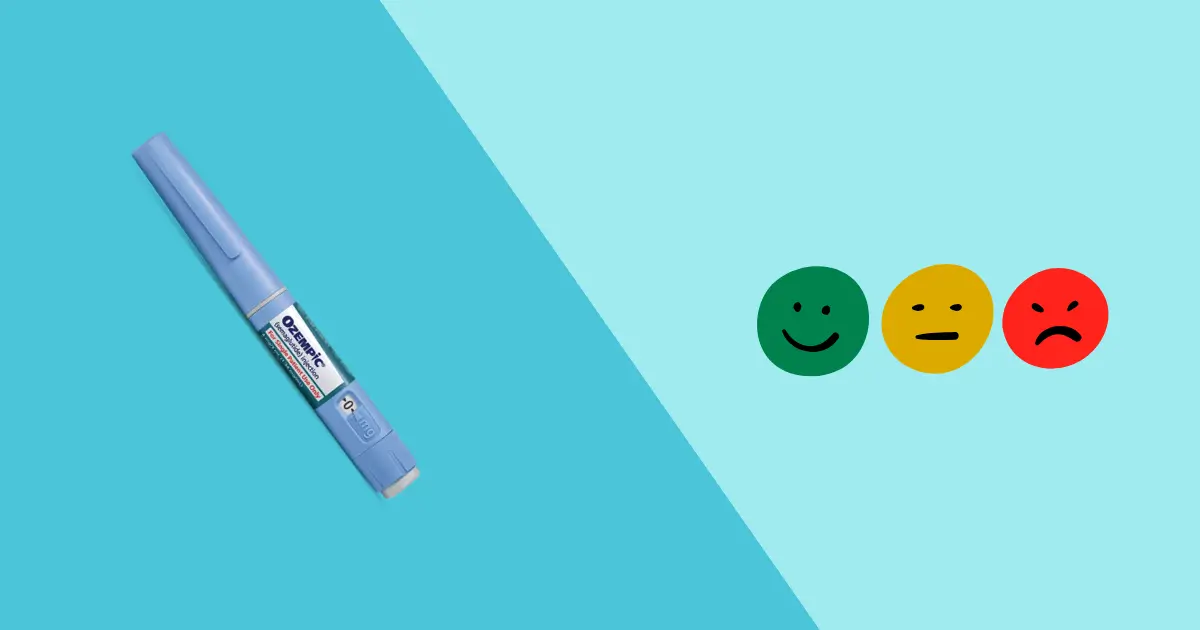Ozempic personality changes: Causes, effects, and how to manage
Key highlights
- “Ozempic personality” refers to changes in mood and behaviour, such as anxiety, depression, and suicidal thoughts, reported by Ozempic users.
- The FDA has not found any evidence of personality changes, but many clinical studies show the potential risk of worsening mental health issues while using Ozempic.
- These symptoms are manageable with dose adjustments under medical guidance and a few lifestyle modifications.
Ozempic (semaglutide) is used to lower blood sugar levels and reduce the risk of cardiovascular incidents (such as heart attack and stroke) in patients with type 2 diabetes. It is approved by the US. Food and Drug Administration (FDA) for maintaining glycemic control in patients with type 2 diabetes, when used as an adjunct to exercise and a healthy lifestyle. It helps lower HbA1c levels in these patients.
Ozempic is injected once weekly under the skin of things, abdomen, and upper arm. It is a GLP-1 agonist, which means it mimics the action of a naturally produced hormone, glucagon-like peptide-1, in the brain to stimulate the release of insulin. Moreover, it decreases your appetite by giving you a feeling of satiety or fullness to reduce hunger cravings and maintain blood sugar levels.
Ozempic is used off-label for weight management and weight loss. Patients have shown an average of 15% weight reduction with it. However, the FDA has not approved it for chronic weight management.
Although Ozempic is highly effective in lowering blood sugar levels and weight management, it is associated with various side effects. These include nausea, vomiting, diarrhea, constipation, and abdominal pain. In addition to these general side effects, it can cause changes in emotions and behaviour, mood swings, and irritability. This shift in mood and personality leads to a cluster of symptoms termed “Ozempic personality”.
If you’re taking Ozempic and have experienced a sudden change in your personality, it might be due to Ozempic use. The good news is, these symptoms are temporary and manageable with a few lifestyle modifications. Let’s get into the details below.
What is Ozempic personality?
The term “Ozempic personality” refers to a cluster of feelings or symptoms that Ozempic users may experience due to changes in mood and behaviour. The symptoms of Ozempic personality include the following:
- Anxiety and depression
- Low sex drive or decreased libido
- Low mood and energy
- Anhedonia (lack of interest in activities that were the source of joy before starting Ozempic)
- Suicidal thoughts
- Difficulty focusing
- Nervousness
- Restlessness
- Fatigue
- Sleep changes
You might have heard terms like Ozempic face and Ozempic butt before. These are not medical terms; they are used by the general public to describe weight loss changes and side effects with Ozempic and similar drugs like Zepbound, Wegovy, and Mounjaro. Similarly, “Ozempic personality” has gained traction nowadays as a side effect of Ozempic that affects the mental health of individuals.
These symptoms appear due to certain changes in the “reward center” of your brain and dopamine receptors. Your brain’s dopaminergic system is involved in pleasure, motivation, and hunger cravings. Research studies show that GLP-1 receptors may directly or indirectly affect your brain’s reward system to give you a feeling of satiety and fullness. The brain’s reward system is responsible for good mood and pleasure. When it is affected by GLP-1 receptor agonists, you may experience behavioural changes and low mood (depression) as a result of the medication and its effects on your body.
Can Ozempic cause personality changes?
The effectiveness of Ozempic in improving blood sugar levels and weight management is well documented, but its psychological side effects are still unclear. Some patients experience significant changes in mood and behaviour, while others do not. The popularity of the term “Ozempic personality” on social media has raised concerns about Ozempic use lately.
Some research studies demonstrated that Ozempic affects the mental health of its users, leading to depression and anxiety, which was resolved when they stopped taking it. A study shows that GLP-1 receptor stimulation increases the expression of dopamine transporters, reducing free dopamine levels in the brain. The dysfunction in the dopaminergic system can be the reason for depression, anxiety, behavioral changes, emotional sensitivity and anhedonia.
Another study indicates that GLP-1 medications have both anxiogenic (that causes anxiety) and antidepressant effects. Acute use of Ozempic in rodents increased anxiety, while long-term use reduced it.
Keeping the potential side effects of Ozempic in mins, the World Health Organization (WHO) analysis found a link between social ideation and semaglutide use. Semaglutide seemed to have more reports of suicidal thoughts when compared with other anti-obesity and anti-diabetic drugs such as metformin, dapagliflozin, and orlistat. This pattern was more significant in individuals who already had mental health issues or were on medications like antidepressants or anti-anxiety drugs. According to this report, rapid weight loss, inability to eat, low appetite, and lifestyle changes can also affect mood and behavior.
More research studies are needed to confirm whether Ozempic can really cause mental health issues.
How long do mood changes last while on Ozempic?
Mood and behavioural changes while on Ozempic are usually temporary when they occur after Ozempic use. They get resolved when you stop taking the medication. The medication has a half-life of 7 days and takes 5 weeks to get eliminated from your body completely. It means mood changes can last for a maximum of 5 weeks after the last dose when administered once weekly.
However, it is important to remember that not everyone experiences these mood changes.
Are personality changes common with Ozempic?
Ozempic can cause personality changes in “some” individuals, but these side effects are not considered common. There are several anecdotal studies based on individual results that demonstrate that some patients experience personality changes after Ozempic use.
The U.S. Food and Administration (FDA) conducted a detailed review of reports on the increased risk of suicidal ideation with GLP-1 receptors. Reviews of these clinical trials could not find a clear relationship between GLP-1 receptor agonists like semaglutide and mental health issues. However, the FDA states that we “can not” rule out the small risk that may exist. If patients experience depression, unusual thoughts, changes in behaviour, or suicidal thoughts, they should immediately consult healthcare providers.
A study analysed the risk of depression, anxiety, and suicidal behaviour in patients with obesity after using GLP-1 receptor agonists compared to non-GLP-1 receptor agonists. This study observed a 2-4 fold increased risk of suicidal thoughts and suicidal attempts in the Ozempic group compared to others. The risk of mental health issues varies among individuals. However, Wegovy demonstrated the highest risk for anxiety and major depressive disorders.
Can Ozempic cause long-term personality changes?
Long-term personality changes are not well documented with Ozempic use. Symptoms of Ozempic personality usually improve when you stop using it. However, if you take it for a long period, it may bring a few personality changes. Ozempic can alter your relationship with food. You may not feel like eating your favourite foods or get pleasure after eating them. It can affect your drive to eat in the long run. Loss of attraction towards palatable foods can cause depression and a feeling of isolation.
Studies show that Ozempic users are less interested in palatable and savory foods, carbonated drinks, sugary snacks, and processed foods. These changes are not limited to food choices only; they may experience a change in addictive behaviors like alcohol intake, nail biting, and smoking.
Common psychological side effects reported with Ozempic
Individuals using Ozempic may experience the following psychological side effects:
1. Anxiety or restlessness
Anxiety or restlessness is the most commonly reported psychological side effect of Ozempic that contributes to Ozempic personality. It may exacerbate depression and mood swings. However, individuals with already existing mental issues may experience more worsening symptoms compared to healthy ones.
2. Irritability or frustration
Ozempic can make some users agitated, irritable, and frustrated. They may display abnormal behaviour. Irritability usually results from anxiety and depression due to Ozempic personality.
3. Emotional sensitivity or mood swings
Changes in dopaminergic receptors or the brain’s reward system due to GLP-1 receptor agonists can lead to low mood and emotional sensitivity.
4. Difficulty focusing
Ozempic use can cause shakiness and confusion, which makes it difficult for people to focus and concentrate.
4. Lower motivation or energy
Depression and anxiety associated with Ozempic use can lower your motivation and energy. You may not feel like doing your routine tasks.
Why does Ozempic cause personality or mood changes?
The exact mechanism of personality or mood changes while taking Ozempic is still unknown. However, the following factors may contribute to this condition:
Role of GLP-1 receptor agonists
Glucagon-like peptide-1 is a hormone that is released from your gut after food intake. It releases insulin from the pancreas and sends signals to your brain to give a feeling of satiety. It can cross the blood-brain barrier in your brain where it regulates the release of several neurotransmitters including serotonin, GABA, dopamine, and glutamate. Dopamine and serotonin give you a feeling of pleasure after having meals.
GLP-1 drugs like semaglutide (Wegovy, Ozempic, and Rybelsus) and GLP-1/GIP drugs like tirzepatide (Mounjaro and Zepbound) increase the activation of dopaminergic neurons and the expression of dopamine receptors. It reduces the levels of free dopamine in the brain. Less availability of free dopamine causes dysfunction in your brain’s reward system.
Dopamine is responsible for mood regulation, concentration, memory, motivation, and pleasure. The dysfunction in the dopamine center of your brain leads to low mood and energy, depression, lack of motivation, inability to focus, and changes in sleep.
Changes in blood sugar levels
Ozempic is used to improve blood sugar levels in type 2 diabetes patients when used as an adjunct to diet and exercise. In order to maintain their blood sugar levels, Ozempic users are restricted to a low-calorie diet. Dieting itself can be psychologically stressful for patients. Medical research studies have found that there is a strong relationship between dieting and stress. Dieting activates the release of cortisol in the body. Higher cortisol levels in the blood activate the hypothalamus-pituitary axis (HPA axis), which is your body’s stress response system. It triggers anxiety and depression and leads to low energy and motivation.
Therefore, dieting in order to maintain blood glucose levels can be the possible cause of mood changes when using Ozempic.
Impact of weight loss
When you undergo weight loss treatment, drastic weight reduction may impact how you feel emotionally and psychologically. Your brain adapts to eating less, and the body requires fewer calories than normal. Appetite suppression does not provide your brain with the usual amount of energy it needs. Your body may become deprived of essential nutrients. As a result, you may experience depression, irritability, lack of focus, brain fog, poor memory, and mood swings.
Moreover, drastic weight loss can disrupt hormonal regulation in your body. Your body may release less hormones that regulate mood and energy. These include estrogen and testosterone. Hormonal shifts can also cause personality and mood changes in Ozempic users.
How to manage mood changes while using Ozempic
If you experience mood changes while on Ozempic, you can easily manage them with a few lifestyle modifications and careful monitoring. The following are tips to improve your mental health and overall well-being when using Ozempic:
1. Monitor your symptoms
Keep a journal to note changes in mood, behaviour, and anxiety levels along with blood sugar levels. This record will help your doctor identify patterns of your symptoms and decide how to manage them.
Some symptoms are manageable with slight dose adjustments, while others need a different approach. However, it is necessary to keep a record of significant changes you feel and share this information with your healthcare provider.
2. Diet and lifestyle adjustments
Although Ozempic suppresses your appetite, it doesn’t mean you should stop eating healthy foods. Skipping meals can affect your physical and mental health. Eat a balanced and nutrient-rich diet like whole grains, fruits, vegetables, and proteins to provide your brain with enough energy.
Exercise plays a critical role in improving emotional well-being and has a positive impact on mental health. Regular exercise not only helps you shed extra pounds and overcome sluggishness, but it also releases “feel good” chemicals like serotonin and dopamine in the brain. These chemicals elevate mood and energy. Research studies show that yoga, meditation, and stretching can relieve stress and improve memory and focus.
3. Stress management
If you experience mood changes while on Ozempic, mindfulness techniques can be helpful. You can try breathing exercises and meditation to manage stress.
Counseling and cognitive behavioural therapy (CBT) are helpful for patients struggling with already existing mental health issues that have worsened with Ozempic use. Therapists use various methods to develop coping mechanisms and help change thinking patterns in affected individuals.
4. Dosage adjustments
If your mood changes persist despite taking preventive measures, consult your healthcare provider. They may adjust the dosage and evaluate its impact on your mental health.
Keep track of your blood sugar level during dose adjustments. Follow up regularly to ensure your doctor is aware of changes you experience and treats them accordingly.
5. Hydration
Since Ozempic suppresses your appetite and reduces hunger cravings, you may forget to drink adequate water. Dehydration can cause headaches, brain fog, irritability, and make your anxiety worse. Drink at least 6-8 glasses of water every day to keep your body well hydrated.
You can also try fresh juices or add a few slices of fruits into it to enhance its taste. Staying hydrated helps you overcome mental health problems.
5. Prioritize sleep
Insufficient sleep or lack of sleep has a negative impact on your brain functioning. It can cause irritability, inability to concentrate, dizziness, sluggishness, confusion, mood swings, or even suicidal thoughts. Poor sleep can make it difficult to cope with mood changes due to Ozempic use. Try to sleep at least 7-8 hours each night. Good sleep can help you overcome anxiety and depression.
Moreover, good quality sleep with fewer disruptions can also be helpful. Frequent sleep disturbances are associated with a higher risk of mental health issues. They affect the body’s stress response system and disrupt the circadian rhythm, making you vulnerable to depression and anxiety.
In order to improve your sleep hygiene, create a calming environment in your bedroom, turn off the lights, remove electronics from your room, minimize your screen time, and practice relaxation exercises before you fall asleep.
5. Speak to your healthcare provider
If you experience significant mood and behavioural changes, depression, severe anxiety, aggression, or suicidal thoughts while taking Ozempic, immediately consult a healthcare professional.
Your doctor will adjust its dosage or recommend alternative treatment plan for you. They may refer you to mental health professionals if needed, depending on the severity of your symptoms.
Bottom line
Ozempic (semaglutide) is an FDA-approved drug for managing type 2 diabetes. It is also used off-label for weight management. Some Ozempic users tend to experience personality and mood changes and this side effect is commonly referred to as “Ozempic personality.”
Ozempic personality is a cluster of feelings and symptoms like depression, anxiety, suicidal thoughts, and irritability. The U.S. Food and Drug Administration (FDA) has not found any evidence of these changes, but there are a few clinical research studies that indicate Ozempic can cause changes in mood and personality. Individuals with existing mental health issues are more prone to these changes.
These side effects are manageable with a few lifestyle changes and medical guidance. If you experience any changes in your behaviour and mood while on Ozempic, consult your doctor to address these concerns and improve your mental health.







